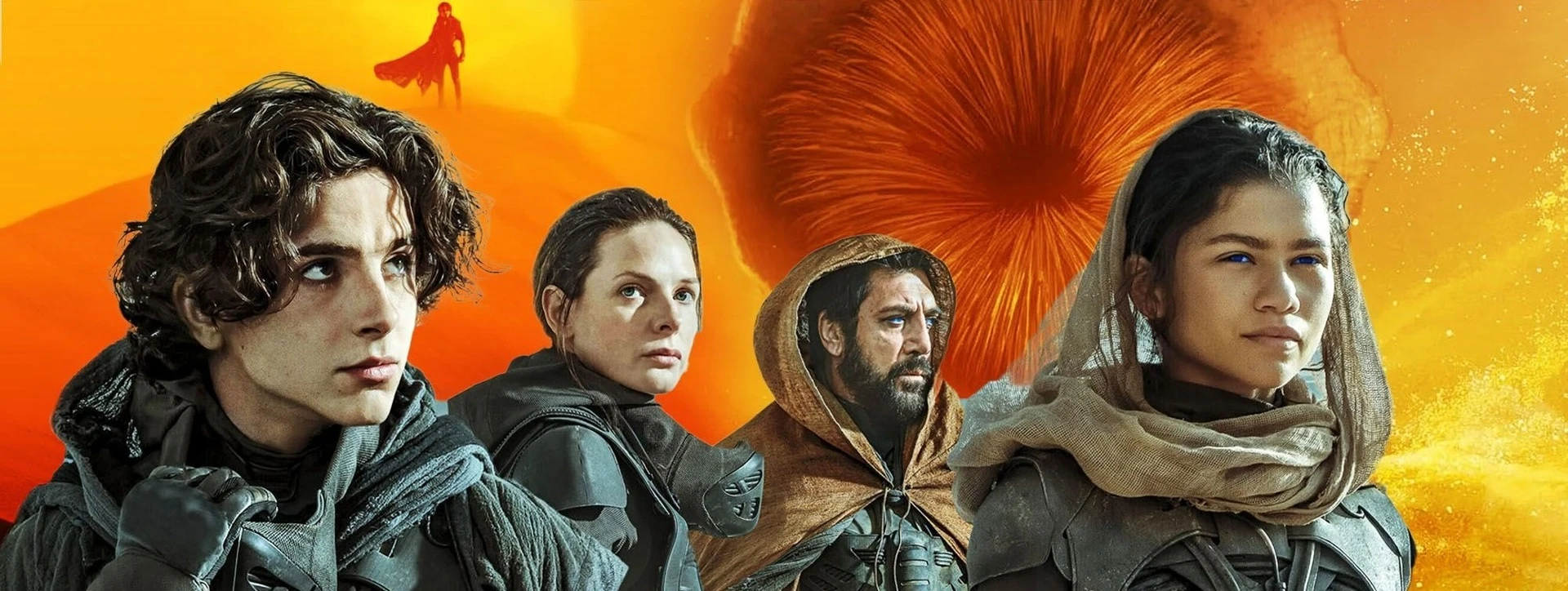No products in the cart.
Decoding ‘Dune 2’
“Dune 2” might spark debates due to its deviations from the original source material. However, one cannot deny Denis Villeneuve’s talent in emotively retelling the epic story.

Following the debut of the first installment in 2021, Denis Villeneuve’s “Dune: Part Two” once again captivates cinephiles. The film follows the protagonist Paul Atreides (Timothée Chalamet) as he journeys alongside Chani and the Fremen to seek revenge against those who slaughtered his family.
The film has received a torrent of praise for faithfully conveying the essence of the original novel onto the big screen. The universe that the “Dune” sequel constructs is grand beyond imagination, filled with enchanting saga and an intriguingly unfamiliar ambiance.
The Conclusion of “Dune: Part Two”
“Dune: Part Two” delivers a grand finale based on Frank Herbert’s original work, setting the stage for the expansion of the film series. It continues the events of “Dune” (2021), tracing Paul Atreides’ journey of integration into the Fremen culture and his acceptance as the chosen savior of Arrakis’ indigenous people.
The film’s climax focuses on the challenges Paul faces in becoming the new Emperor, including launching an attack against the Harkonnen family, defeating Baron Vladimir and his grandson Feyd-Rautha to claim rulership. Everything unfolds as Paul feared when he first glimpsed visions of the future.
Key to the conclusion of “Dune 2” is Paul Atreides’ acceptance of his fate as “Lisan al Gaib,” the savior of Arrakis and the conquering Emperor of the entire universe. Throughout most of the film, Chalamet’s character struggles with destiny and the complexities of redemption.
Paul once foresaw millions falling if he chose to march south on Arrakis. He also desired to prove himself and aid the indigenous people in liberation. However, matters become complicated as the faith and reverence that the Fremen bestow upon Paul are the result of his mother’s covert influence.
When Feyd-Rautha’s forces devastate the northern territories of Arrakis, Paul is forced to make a choice. His plan involves gaining the full power of the Bene Gesserit by consuming the Water of Life. He knows that his miraculous feat will garner the support of the entire Fremen populace, granting him unrivaled power on Arrakis. The Fremen army proves formidable against the Harkonnens, especially when combined with the Atreides’ atomic weapons.
With this newfound power, Paul boldly challenges Emperor Shaddam IV, leading to a spectacular coup. There are two specific steps in Paul’s plan to dethrone Shaddam from this point on. First, he requests to marry Princess Irulan to ensure the Corrino bloodline’s continued rule. The next step is to duel Feyd-Rautha as the Emperor’s champion. Paul’s killing of Feyd-Rautha marks the end of the Harkonnen line and sets the clear path for his ascension to Emperor, regardless of the other Great Houses’ acceptance of the outcome.
He liberates Arrakis from Harkonnen rule by taking power into his own hands, simultaneously consolidating power for the Atreides, avenging his family’s extermination. Paul also becomes the Fremen’s savior under the title of Lisan al Gaib, the Emperor of the universe.
Does Paul Truly Love Chani?
Alongside Paul’s journey of embracing his destiny, his relationship with Chani is also an essential detail in “Dune: Part Two.”
Initially, Denis Villeneuve portrays it as a romantic, positive love story, typical of many “chosen one” narratives. However, the sequel complicates this relationship, leaving viewers unsure if Paul’s feelings for Chani are genuine, especially when Paul decides to marry Princess Irulan instead of staying with her.
In reality, Paul does not have feelings for Irulan, and the marriage is merely a strategic decision to secure the throne. However, the price to pay is the relationship between him and Chani. Paul loves her, but he will not relinquish power for it. This notion becomes even clearer after he consumes the Water of Life.
Conversely, Chani also harbors deep feelings for Paul but will not love him unconditionally. Throughout the film, her feelings for the “chosen one” undergo significant fluctuations. As Paul begins to integrate with the Fremen, Chani hesitates before accepting him. She is also one of the few who refuses to believe the Bene Gesserit prophecy of Lisan al Gaib, seeing it as nonsensical and detrimental to the Fremen’s continued servitude.
For this reason, Chani loves Paul in the first half of the film but becomes increasingly angry with him in the latter half, reaching its peak when Paul decides to marry Irulan. This has been somewhat altered from Frank Herbert’s original novel. In the book, she stands by Paul’s side and supports him in everything, even when Paul decides to marry Irulan for political machinations. Another change is that Denis Villeneuve’s film does not mention the event of Chani being pregnant. In the novel, she bears their first child together – Leto II. However, the child later dies in the conflict with the Emperor’s Sardaukar army.
There will be debates when directors change some details of the story. However, one cannot deny Denis Villeneuve’s success in recreating a vast, multifaceted world, containing many cultural aspects, customs, and complex political structures on the big screen. Alongside preserving the essence of the original novel, he also introduces discoveries and changes, making the film’s content fresher and more compelling.
